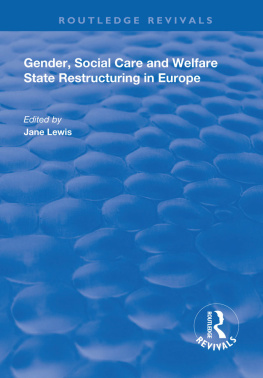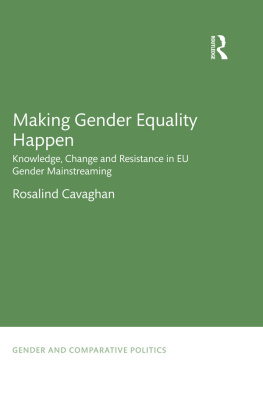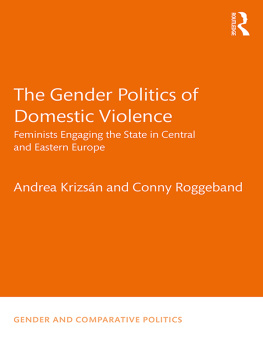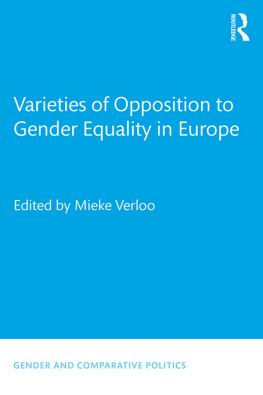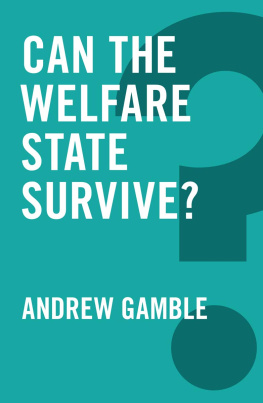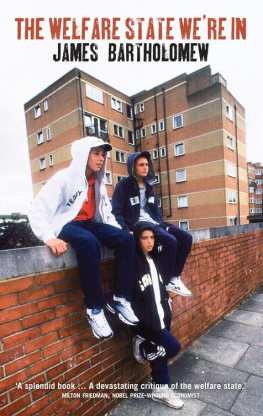GENDER EQUALITY IN THE WELFARE STATE?
Gillian Pascall
First published in Great Britain in 2012 by
Policy Press University of Bristol 6th Floor Howard House Queens Avenue Clifton Bristol BS8 1SD UK Tel +44 (0)117 331 5020 Fax +44 (0)117 331 5367 e-mail
North American office: Policy Press c/o The University of Chicago Press 1427 East 60th Street Chicago, IL 60637, USA t: +1 773 702 7700 f: +1 773-702-9756
Policy Press 2012
British Library Cataloguing in Publication Data
A catalogue record for this book is available from the British Library.
Library of Congress Cataloging-in-Publication Data
A catalog record for this book has been requested.
ISBN 978 1 44730 918 5 epub
ISBN 978 1 44730 919 2 Kindle
The right of Gillian Pascall to be identified as author of this work has been asserted by her in accordance with the Copyright, Designs and Patents Act 1988.
All rights reserved: no part of this publication may be reproduced, stored in a retrieval system, or transmitted in any form or by any means, electronic, mechanical, photocopying, recording, or otherwise without the prior permission of Policy Press.
The statements and opinions contained within this publication are solely those of the author and not of the University of Bristol or Policy Press. The University of Bristol and Policy Press disclaim responsibility for any injury to persons or property resulting from any material published in this publication.
Policy Press works to counter discrimination on grounds of gender, race, disability, age and sexuality.
Cover design by Robin Hawes
Front cover: image kindly supplied by www.alamy.com
Readers Guide
This book has been optimised for PDA.
Tables may have been presented to accommodate this devices limitations.
Image presentation is limited by this devices limitations.
To all the Pascalls: to Robert, to our children Sophie, Hugh, Clara, and to our granddaughter, Esme
The author and publisher gratefully acknowledge the permission granted to reproduce copyright material in this book. All reasonable efforts have been made to identify the copyright holders and to obtain permission for use. If copyright has been unwittingly infringed, we apologise and ask that the publisher is notified of any errors or omissions for inclusion in future reprints or editions.
Sources: : European Union, 1995-2012.
Contents
Gillian Pascall is Professor Emerita of Social Policy at the University of Nottingham, UK, where she has long taught gender and social policy to students, undergraduate and postgraduate, local and international. Relationships between welfare states and gender have been at the centre of her research and publications since Social policy: A feminist analysis (1986). International and comparative interests are represented in work with Professor Anna Kwak: Gender regimes in transition (2005), which studies gender and parenting in CEE countries after state socialism, and with Sirin Sung in Gender in East Asian welfare states: Confucianism or gender equality? (2012).
This book would not have been started without the impetus of Saul Becker, or kept going without the support of Ruth Lister and Fran Bennett.
I have been very lucky to share work over many years at the University of Nottingham with colleagues who will recognise their contribution to my understanding of gender and social policy. Among these are Jane Lewis, Gillian Parker, Becky Morley, Tracey Warren and Elizabeth Fox. Any flaws remain mine, of course.
My family have made difficult times joyful. Without Robert, Sophie, Hugh, Clara and Esme, the book would surely never have been finished.
The book will ask about gender equality in the contemporary UK welfare state. It begins with questions about the roots of gender difference in welfare institutions. The book also asks about change, about how far assumptions and policies have changed to reflect new norms of gender equality. And, because one way to understand our welfare state is to analyse other welfare states, it also asks how gender equalities and inequalities in the UKs welfare assumptions and institutions compare with gender equalities and inequalities in other developed countries:
How equal are the rights of men and women as UK citizens, their rights to services and income, their welfare and wellbeing?
How equal are the responsibilities of men and women to work and care?
Were post-war governments, official reports and legislation assuming gender difference and inequality when they established welfare systems?
To what extent were gender differences built into the foundations of welfare institutions, with traditional assumptions about men as breadwinners and women as carers?
What has been the impact on men and women in public and private lives?
To what extent have equal rights and obligations for men and women been achieved, in public and private life?
How do gender equalities and inequalities compare with other countries?
The idea that we are all equal now has gained currency, to the extent that some authors argue that policy should turn to other priorities (Hakim 2011). Increasingly, our culture assumes that women have achieved equality, and that social problems now revolve around men, who are under-achieving in education, from school examinations to higher education, and have difficulty finding jobs, described by Banyard as The equality illusion (2010). If cultural assumptions that feminism is old-hat prevail, we should also ask about government assumptions about gender equality. Some recent government policies assume that we still need policies to promote equality, through the establishment of the Equality and Human Rights Commission, and the Equality Act 2010, both of which include gender as one of the sources of discrimination and disadvantage. Other policies appear to assume that women can enter the labour market on the same terms as men. In particular, policy for lone mothers increasingly expects them to combine paid employment with care for their children; more generally, women are assumed to have entered the labour market on similar terms to men, to be achieving independent incomes, with which they can pay for their own pensions. But which parts of these ideas are illusions and which parts reality? How equal are women and men in welfare and wellbeing, earnings and incomes, rights and responsibilities? And what are the implications of any persisting gender inequalities?
Equality, and different approaches to equality, are often debated in terms of socio-economic differences, but they are also relevant to gender, partly because societies that are more equal in socio-economic terms tend to be more gender-equal too. Do we want a more equal society or a more mobile one with more equal opportunities? A first argument for equality was made by the National Equality Panel. If, as the National Equality Panel Report found, inequality is carried from one generation to the next it is difficult to see how a deeply unequal society can be a socially mobile one: young people are too trapped by the disadvantage of their family background to flourish and achieve to their full capacity: inequalityacts as a barrier to social mobility (Hills et al 2010: 2). A second argument for equality is that a more equal society allows individual gifts and differences to flourish (Tawney 1964). A society in which women cannot be bishops, whatever their gifts and personal qualities, or which puts cultural barriers preventing men becoming nurses or harpists is one that will limit the expression of peoples talents and the contribution they can make to society. A third argument is that more equal societies are at least as successful economically (Goodin et al 1999), happier (Layard 2005) and healthier (Wilkinson and Pickett 2010) than unequal societies. The damage of inequality limits peoples life expectancy and disability-free life expectancy (Marmot et al 2010), bringing major burdens of disability and care for disabled people to people especially women in poor neighbourhoods.



